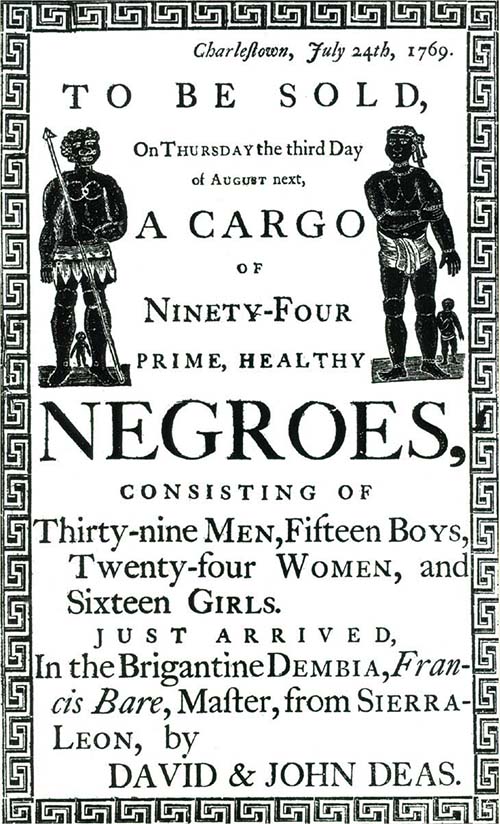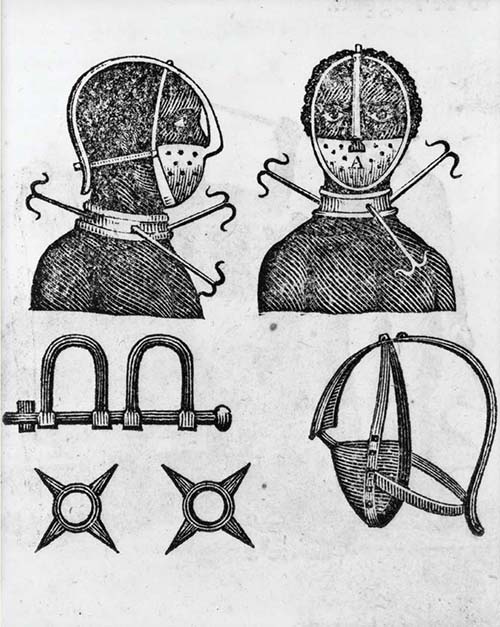America’s History: Printed Page 98
THINKING LIKE A HISTORIAN |  |
Servitude and Slavery
Britain’s American colonies relied heavily on bound labor. Two forms predominated: indentured servitude and African slavery. The idea of being bound to a master is alien to most of us today; the following texts allow us to glimpse some aspects of the experience. In what ways were these two institutions similar, and how did they differ?
Slave advertisement from Charlestown, Virginia, July 24, 1769.
 Source: Courtesy American Antiquarian Society.
Source: Courtesy American Antiquarian Society.Indentured servant advertisement from the Pennsylvania Gazette, 1770. This advertisement offers to sell the remainder of a servant girl’s indenture.
TO BE SOLD, A HEALTHY servant GIRL’S Time, about 17 Years old, who has between 3 and 4 years to serve. She is sold for no other Reason, only there being more Servants than are needful in the family where she is.
N. B. She has had the Small pox, can wash, and do all Sorts of Housework. Enquire of the Printers.
Poem by James Revel, c. 1680. James Revel was an Englishman convicted of theft and transported to Virginia, where he served fourteen years as an indentured servant. Upon returning he published A Poor Unhappy Transported Felon’s Sorrowful Account of His Fourteen Years’ Transportation at Virginia, in America (1680).
At last to my new master’s house I came,
At the town of Wicocc[o]moco call’d by name,
Where my Europian clothes were took from me,
Which never after I again could see.
A canvas shirt and trowsers then they gave,
With a hop-sack frock in which I was to slave:
No shoes nor stockings had I for to wear,
Nor hat, nor cap, both head and feet were bare.
Thus dress’d into the Field I nex[t] must go,
Amongst tobacco plants all day to hoe,
At day break in the morn our work began,
And so held to the setting of the Sun.
My fellow slaves were just five Transports more,
With eighteen Negroes, which is twenty four …
We and the Negroes both alike did fare,
Of work and food we had an equal share.
Mechanisms used to control slaves, from Thomas Branagan, The Penitential Tyrant; or, slave trader reformed, 1807. The shackles and spurs (lower left) were intended to prevent escape; the faceguard with spiked collar (top and lower right) kept its wearer from either eating or lying down.
 Source: Library of Congress.
Source: Library of Congress.Court deposition of Joseph Mulders, July 31, 1649. In a court case in Lower Norfolk County, Virginia indentured servant Joseph Mulders testified that his mistress, Deborah Fernehaugh, brutally beat her maidservant, Charity Dallen.
[Mulders testified] That Deborah Fernehaugh, the Mistress of this deponent, did beate her mayd Sarvant in the quartering house before the dresser more Liken a dogge then a Christian, and that at a Certaine time, I felt her head, which was beaten as soft as a sponge, in one place, and that as there shee was a weeding, shee complained and sayd, her backe bone as shee thought was broken with beating, and that I did see the mayds arme naked which was full of blacke and blew bruises and pinches, and her necke Likewise and that after wards, I tould my Mistress of it and said, that two or three blowes, could not make her in such a Case, and after this my speeches shee Chidge [i.e., chided] the said mayd, for shewing her body to the men, and very often afterwards she [the maid] would have shoen mee, how shee had been beaten, but I refused to have seene it, saying it concernes me not, I will doe my worke and if my Mistress abuse you; you may complaine, and about 8 dayes since, being about the time shee last went to Complaine, I knew of her goeing, but would not tell my mistress of it, although shee asked mee, and sayd I could not chuse but know of it.
Runaway slave advertisement, Chestertown, Maryland, March 12, 1755. Absconding from their masters was a common method of resistance for both slaves and servants, and masters frequently posted runaway advertisements in local newspapers.
Chestertown, Maryland, March 12, 1755. TEN PISTOLES Reward. RAN away last night, from James Ringgold, of Eastern Neck, in Kent county, in the province of Maryland, the two following servant men; one named James Francis, an indented servant for five years, a middle siz’d young fellow, about 26 years of age, of a smooth fair complexion, his hair cut off, is an Englishman, and speaks a little in the west country dialect; was brought up to farming and husbandry: Had on, a country kersey jacket and breeches, blue fearnought jacket, and an old dark colour’d coat. The other a lusty young Mulatto fellow, named Toby, a slave about the same age, he is a well set, clean limb’d, stout fellow neither a very bright or very dark Mulatto, has large nostrils, is a likely fellow, and when he talks drawls his words out in a very slow manner, is no other way remarkable; he had on the same sort of clothes with the other servant, and one of them has a check or striped green and red everlasting jacket on or with them; and perhaps the Mulatto may set up for a cooper or carpenter, having work at both those business, and also understands plantation affairs. Whoever takes up and secures the above persons, and gives notice, so as their master gets them again, shall have Four Pistoles reward for the white servant, and Six Pistoles for the Mulatto. … That this slave should runaway, and attempt getting his liberty, is very alarming, as he has always been too kindly used, if any thing by his master, and one in whom his master has put great confidence, and depended on him to overlook the rest of his slaves, and he had no kind of provocation to go off. It seems to be the interest at least of every gentleman that has slaves, to be active in the beginning of these attempts … THOMAS RINGGOLD.
Sources: (2) Pennsylvania Gazette, May 3, 1770; (3) John Melville Jennings, ed., The Virginia Magazine of History and Biography 56 (April 1948), 187–194; (5) Second to None: A Documentary History of American Women, Vol. 1 (University of Nebraska Press, 1993), 67–68; (6) Pennsylvania Gazette, March 12, 1755.
ANALYZING THE EVIDENCE
Question
What information do the traders in sources 1 and 2 want to convey to prospective buyers, and why? What similarities and differences do you see in the way sellers might choose to market servants and slaves?
Question
What aspects of servitude did James Revel object to (source 3)? How did he compare the experiences of servants and slaves?
Question
Source 4 appeared in an abolitionist work published in New York in 1807. How does that fact influence your interpretation of the images?
Question
How does Mulders grapple with his position as a fellow servant as he testifies against his mistress (source 5)? Based on Mulders’s testimony, the court removed Dallen from Fernehaugh’s household. How might things have worked differently if either Mulders or Dallen had been a slave?
Question
In source 6, what characteristics of each man does the ad emphasize? How does Ringgold view himself as a master, and what does his special plea to other slaveholders tell us about slaveholding culture?
PUTTING IT ALL TOGETHER
Question
Using the sources above, along with what you learned in class and in Chapter 3, write a short essay that compares servitude and slavery. In what ways did African slavery in the British colonies grow out of servitude and bear close similarities to it, and in what ways were slaves set apart and treated fundamentally differently than their servant counterparts?